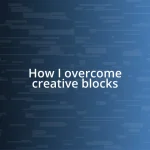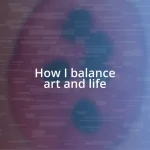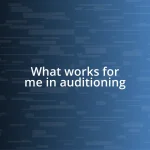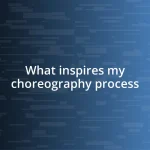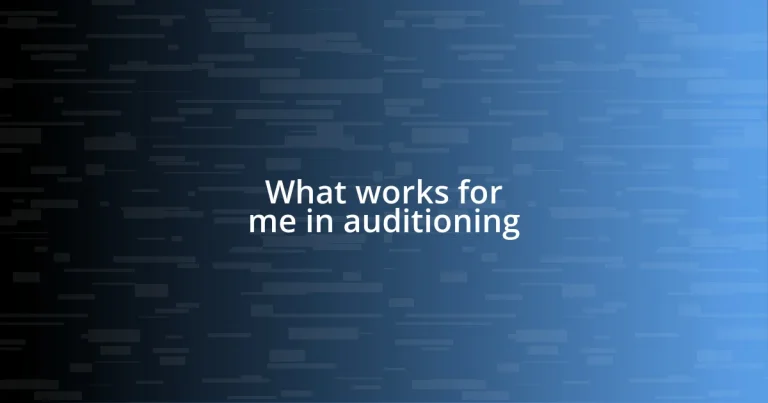Key takeaways:
- Preparation is crucial for auditions; a dedicated rehearsal schedule and understanding the material can turn anxiety into excitement.
- Embrace adaptability and feedback; being flexible during auditions and remaining open to suggestions enhances performance.
- Follow up after auditions with personalized notes, as timely and specific follow-ups can create lasting impressions with casting directors.
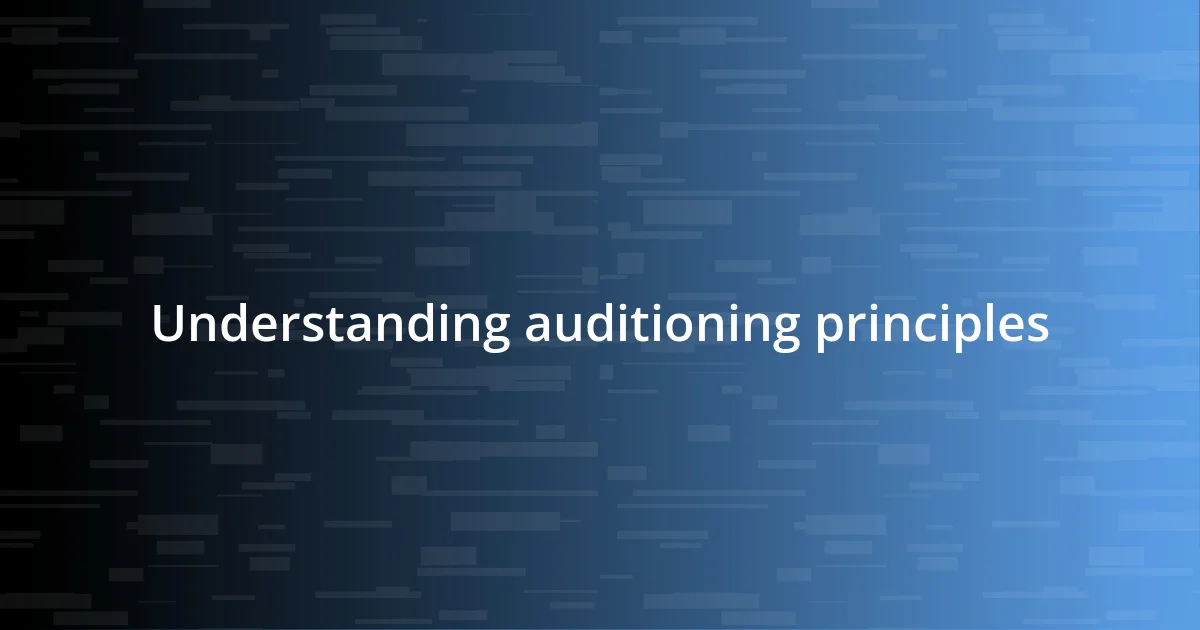
Understanding auditioning principles
One fundamental principle of auditioning is the importance of preparation. I remember a time when I went into an audition feeling underprepared, and the resulting anxiety was almost palpable. It made me wonder: how often do we underestimate the power of rigorous practice in calming our nerves and boosting our confidence?
Another key element lies in understanding the material you’re working with. I always make it a point to delve deep into the character or the piece I am auditioning for. It’s fascinating how fully embracing a role can transform your approach—have you ever experienced how an emotional connection can completely shift your performance?
Finally, don’t overlook the impact of your unique perspective. Every actor brings something different to the table, and that’s what makes auditions so intriguing. I often ask myself, what do I uniquely have to offer? This reflection not only enhances my performances but also helps me stand out in a competitive landscape.
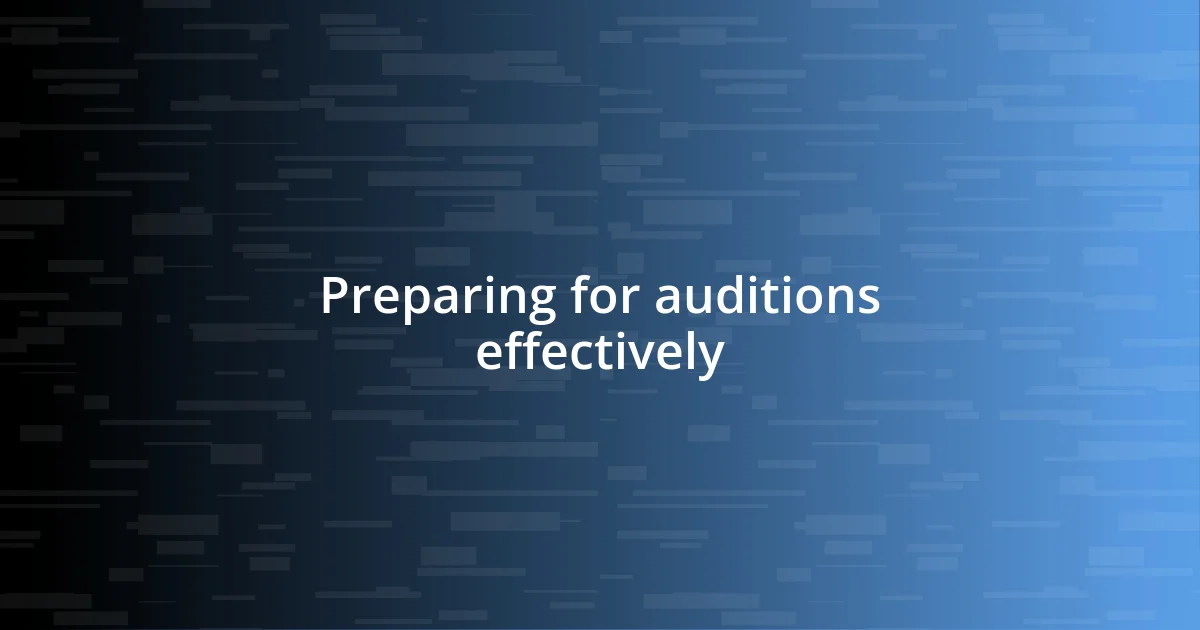
Preparing for auditions effectively
Preparing for auditions effectively requires a strategic approach that combines thorough preparation with self-awareness. I find that creating a dedicated rehearsal schedule significantly enhances my readiness. Recently, I set aside a whole week to focus exclusively on my lines, and by the time the audition came, I felt like I had truly owned the material. Isn’t it incredible how knowing your lines inside out can transform anxiety into excitement?
Another vital aspect is gathering feedback from others. I often ask trusted friends or fellow actors to watch my practice runs. One time, a friend pointed out a subtle gesture I was making that distracted from the emotional weight of the scene. This kind of insight can be invaluable—it reminds me how important it is to remain open to suggestions and view the audition from an outsider’s perspective. Have you ever experienced a turning point like that during preparation?
Finally, I always try to visualize the audition space and the people I will perform for. Imagining this scenario helps me mentally prepare for the environment. A few months back, I found myself in a particularly intense audition setting. Because I had visualized it ahead of time, I was able to lock in on my character immediately. That practice of mental preparation is something I can’t recommend enough; it’s a game changer!
| Preparation Method | Personal Insight |
|---|---|
| Rehearsal Schedule | Helps in transforming anxiety into excitement |
| Getting Feedback | Offers invaluable insights and enhances performance |
| Mental Visualization | Prepares one for real audition scenarios |
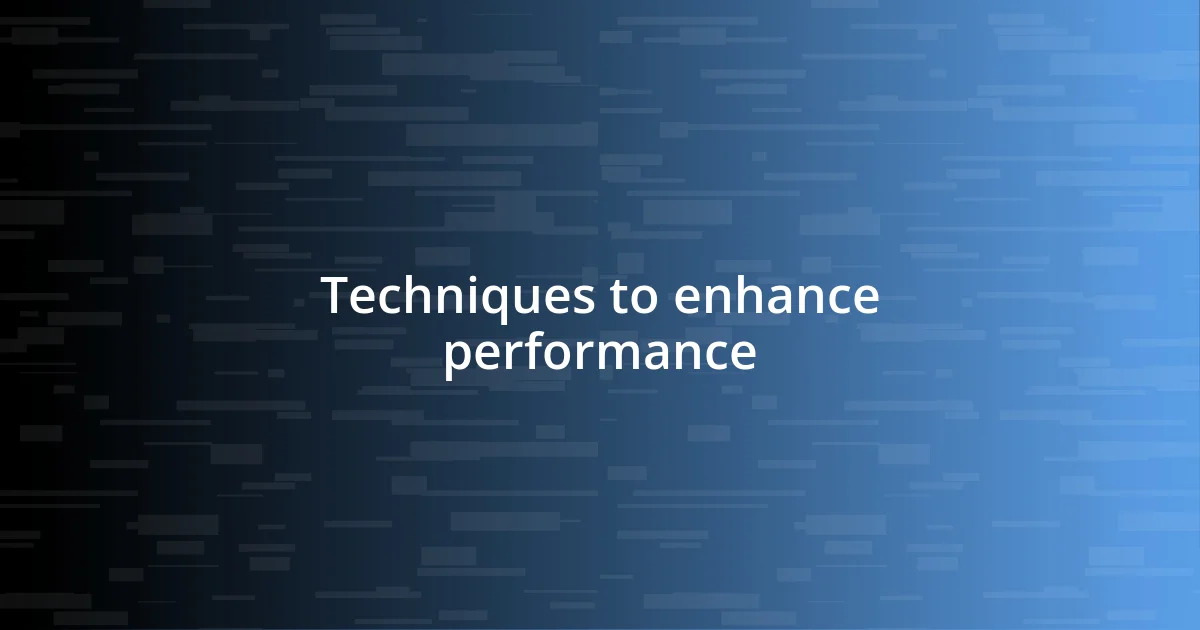
Techniques to enhance performance
In my experience, physical warm-ups can dramatically enhance my performance before an audition. I remember one audition where I didn’t take the time to stretch or focus on my breath beforehand, and I felt tight and inhibited during my performance. A few deep breaths and some simple stretches not only help loosen my body but also connect me to my emotional center—it’s almost like flipping a switch to unlock my full potential.
Here are some techniques that have worked for me:
- Physical Warm-Ups: Engaging in stretching or light movement to release tension.
- Vocal Exercises: Practicing scales or tongue twisters to warm up the voice.
- Mindfulness Practices: Using techniques like meditation or deep breathing to center oneself emotionally.
I also believe in the power of staying adaptable during auditions. This became evident to me when I had to adjust my performance on the fly during an audition where the director changed the scene’s mood last minute. It taught me the importance of being flexible and open to spontaneity. When I can embrace the unexpected, I find new layers in my performance that I didn’t plan for—this adaptability transforms nervousness into an exhilarating challenge!
To promote versatility, consider these strategies:
- Improvisation Exercises: Engaging in improv to build comfort with spontaneity.
- Character Exploration: Experimenting with different takes on the character before the audition.
- Listening Skills: Focusing on what others bring to the scene to react more authentically.
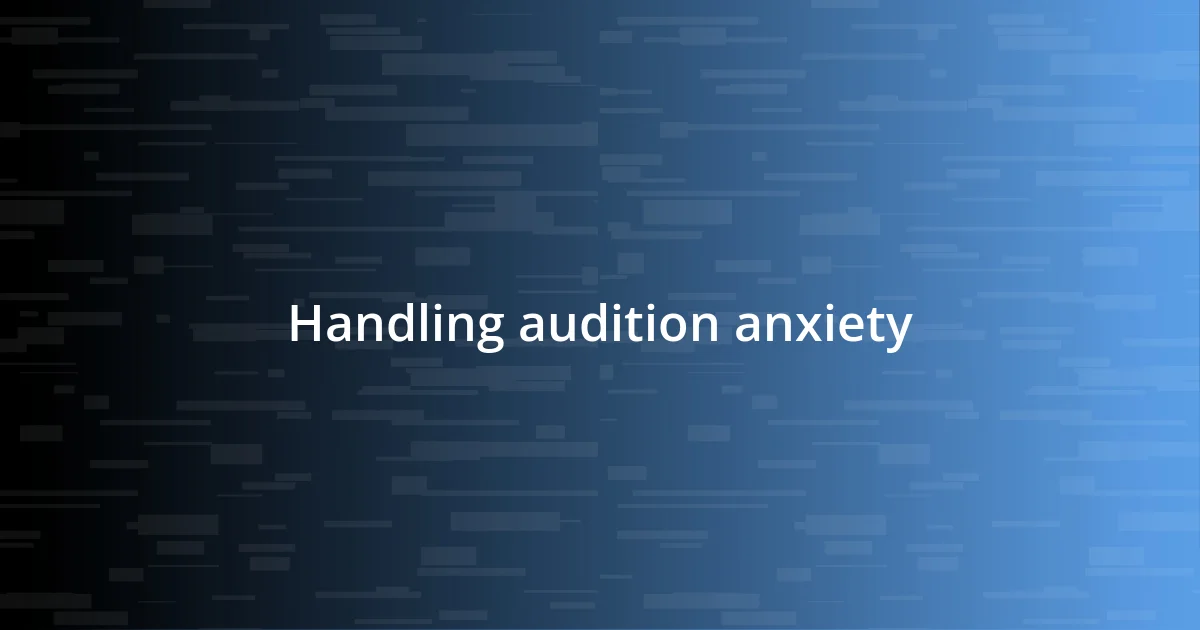
Handling audition anxiety
When it comes to handling audition anxiety, I’ve learned that grounding techniques can make all the difference. I often find myself taking a moment to press my feet firmly into the ground and focus on the sensations—what does the floor feel like beneath me? By anchoring my mind to the present moment, I can silence those anxious thoughts that tend to whirl around like a storm. This practice, simple as it may sound, has saved me more times than I can count.
Another method I swear by is the power of positive affirmations. Before stepping into the audition room, I remind myself that I’ve prepared well and am capable of delivering my best performance. One time, when a casting director walked in, I felt a wave of self-doubt hit me. Instead of succumbing to it, I whispered my go-to affirmation in my head: “I am enough.” It’s amazing how that little shift in mindset can turn anxiety into a fierce determination to succeed.
I’ve also discovered the value of embracing my nerves rather than resisting them. I recall a particularly nerve-wracking audition that I almost skipped. But when I owned my anxiety and viewed it as excitement instead, I felt a surge of energy when I performed. Have you ever felt that little flicker of adrenaline transforming into enthusiasm? It’s a thrilling feeling, and it reminds me that those butterflies in my stomach are just signs that I care deeply about what I’m doing.
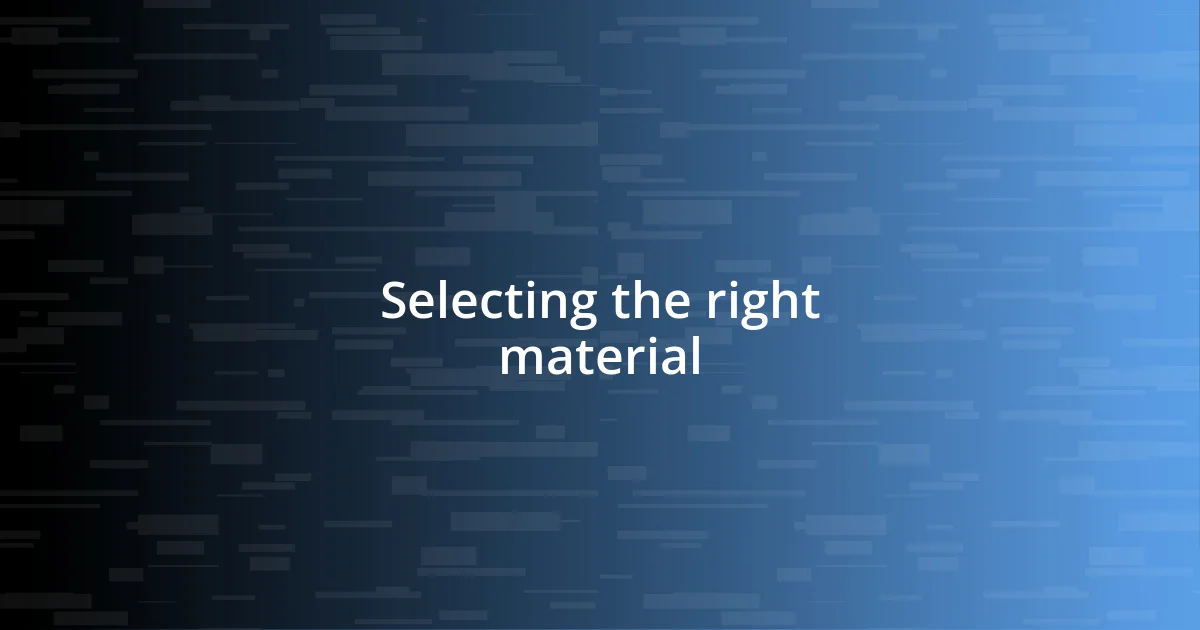
Selecting the right material
Selecting the right material for an audition is one of those crucial elements that can truly make or break your performance. I remember one time I chose a dramatic monologue that completely didn’t align with my personality. As I stood there, reciting lines that felt foreign to me, I could sense the disconnect. The lesson? Selecting material that resonates with who you are is vital. It allows authenticity to shine through, making your performance more relatable and impactful.
I always recommend taking a moment to reflect on what excites you. For instance, when I auditioned for a role in a quirky comedy, I selected a lighthearted scene that brought out my own sense of humor. Not only did I enjoy performing it, but I could see the casting director’s eyes light up as I delivered the lines. Isn’t it fascinating how your passion for the material translates into energy that captivates the audience?
Additionally, I’ve found that versatility in your selection is key. If you have a few pieces in your arsenal—some dramatic, some comedic—you can tailor your audition to suit the role, making your chances of success even greater. There was a time when a director wanted to see a different side of me during auditions, and having both a serious and a fun piece ready allowed me to adapt on the spot. This flexibility not only boosts your confidence but also demonstrates your range as an actor. How do you think being adaptable in material selection would impact your own auditioning experience?
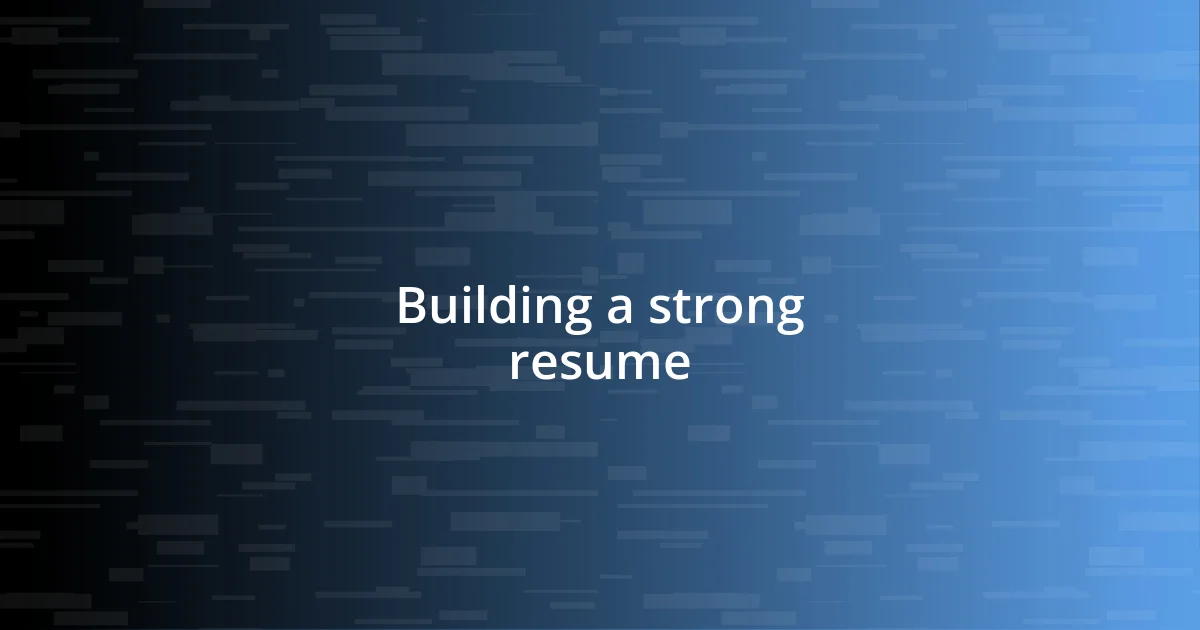
Building a strong resume
Building a strong resume is a fundamental aspect of the auditioning process that cannot be overlooked. In my experience, what really stands out are not just the performances listed but the way I frame my experiences. For instance, I recall a time when I articulated my unique skills—like dancing or stage combat—in a way that showcased my versatility. Instead of merely stating “attended acting classes,” I highlighted specific techniques I mastered, which I believe made a more memorable impression.
I also realized that including a brief description of my roles made my resume more inviting and engaging. Just recently, I updated my resume to include a fun note about playing a lively character who was the “life of the party.” It turned out to be a great conversation starter during auditions, sparking interest and giving me a chance to share my excitement about the role. Have you ever thought about how weaving personal stories into your resume could bring it to life?
Lastly, the visual appeal of my resume plays a pivotal role in drawing attention. I’ve experimented with different formats, but what’s worked best for me is a clean, professional layout combined with a pop of color that reflects my personality. When I attended a casting call and saw my resume printed out amongst others, I felt confident that its polished appearance would linger in the minds of the casting directors. Don’t underestimate how a thoughtfully designed resume can elevate your presentation and set you apart from the crowd.
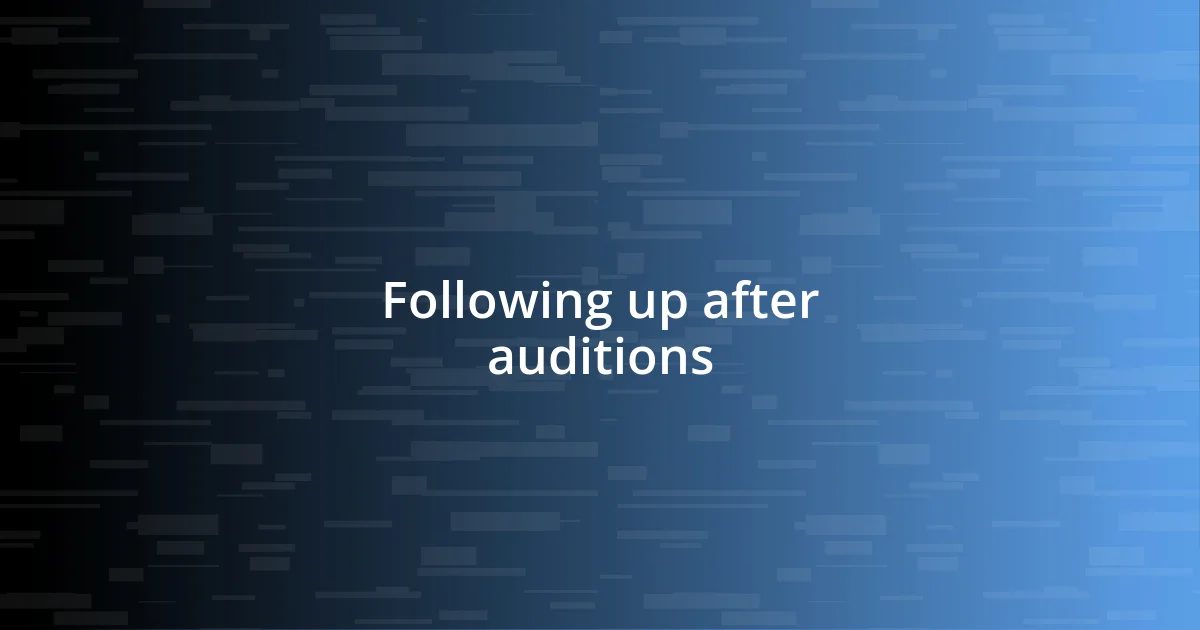
Following up after auditions
Following up after auditions is often overlooked, but it can truly make a difference in how casting directors perceive you. I remember once after an audition, I sent a simple email thanking the director for the opportunity. It felt a bit vulnerable at first, but I was pleasantly surprised when they responded, mentioning how my enthusiasm stood out. This small gesture not only helped me stay on their radar but also fostered a connection that felt genuine.
The timing of your follow-up is equally important. I usually aim to send a note within 24 to 48 hours after the audition. There was a time I waited a bit longer, and it felt as though my enthusiasm had faded by then. By reaching out promptly, you keep the energy alive and show that you’re genuinely interested in the project. Have you found that expressing your excitement can influence the decision-making process?
Lastly, I’ve learned to personalize my follow-up. Instead of using a generic template, I make sure to reference specific moments from the audition or the casting director’s insights. During one follow-up, I mentioned how the director’s feedback on my improvisation sparked a thought for how I could further develop the character. It’s these little details that can resonate and keep the conversation going. Have you ever considered how those personal touches can make your follow-up stand out?


